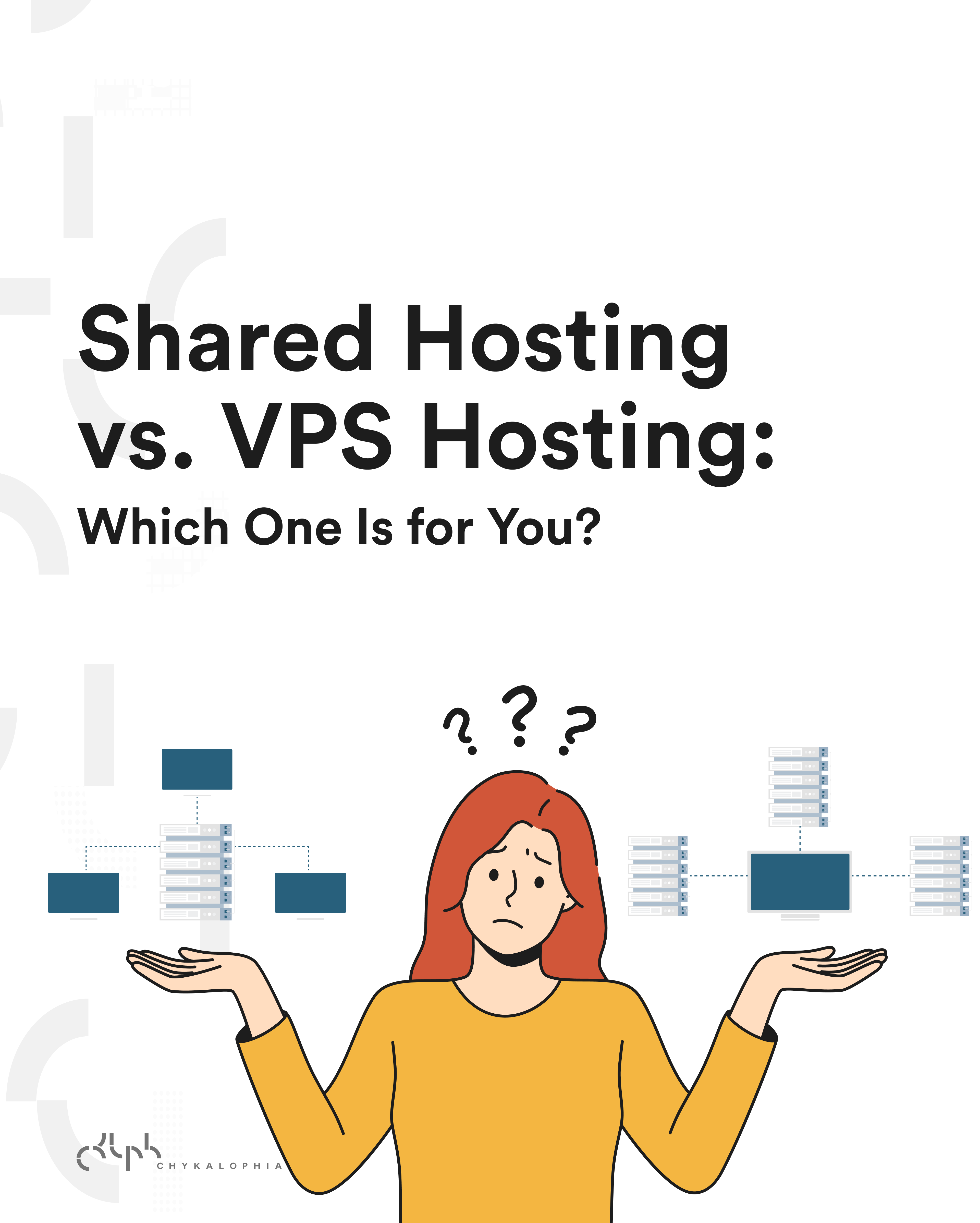Trying to compare shared vs. VPS hosting is an important step for both budget and security conscious folks. Each option offers distinct advantages and is suited to different needs. To shed light on this topic, we spoke with our CTO, Peter Krzyzek, who shared invaluable insights into the practical applications and considerations surrounding these two hosting types.
Shared vs. VPS hosting: A Breakdown
What is VPS Hosting?
Let’s break it down:
Server: A server functions as a robust computer, storing all website data and files. Whenever you input a domain name in your browser, the server is responsible for delivering the site to your screen.
Virtual: Virtualization technology divides a complete server into several virtual machines. It functions as multiple distinct servers, despite being a single physical piece of hardware.
Private: In this context, “private” signifies exclusivity.
A good virtual private server (VPS) exclusively reserves your allocated virtual server and its resources for you. This setup guarantees a dedicated hosting environment just for you, preventing other users from sharing resources such as RAM, CPU power, and data.
What is Shared Hosting?
Shared hosting is a cost-effective web hosting setup where multiple websites share resources on a single server. It’s suitable for small to medium-sized websites with moderate traffic but may cause slower performance during peak traffic. Despite these drawbacks, shared hosting remains widely used due to its affordability and ease of use.
Shared vs. VPS hosting: Practical Examples and Preferences
Let’s explore practical examples showcasing the strengths of shared vs. VPS hosting, as well as other options.
VPS Hosting
Compared to owning or leasing a complete server, VPS systems are notably cheaper. This affordability makes them an attractive option for businesses, particularly small enterprises, that aim to minimize costs while still retaining a degree of control over their digital infrastructure.
Additionally, VPS setups are quick to deploy, nearly infinitely scalable and most places make them straightforward to customize to your unique resource needs. This makes them suitable for both production and development testing purposes where flexibility and not wanting to know about the physical infrastructure are desired. As Peter emphasizes, “VPS hosting is great for one, and only one, main reason: flexibility.”
Peter Krzyzek:
“As most businesses in the world fall into the small business category.
The most practical use case for a VPS is a small business who doesn’t want to or can invest much in their digital infrastructure, but still wants some level of control.
VPS’s come in all shapes, sizes, and resources and therefore are great for customizing things to your heart’s content all while not worrying about the underlying infrastructure. They are used by businesses of all sizes, are a VPS can live for as long or as short of a time as needed in-order to get the job done.”
Shared Hosting
Shared hosting, on the other hand, is beneficial for individuals or small businesses with limited technical knowledge or resources. By sharing server resources with other users, shared hosting providers offer cost-effective solutions that are easy to set up and manage. However, shared hosting may not be suitable for websites or applications with high traffic volumes or specific customization requirements.
The real negative of shared hosting is the potential for security holes caused by others whom share your server environment, as well as other users eating up the shared resources. Much like a common watering hole where jungle animals all share the same water … if one animal takes up all the water for themselves, there won’t be any left for others. In the business sense: this means at the ‘cost’ of stability, security and uptime guarantees, you can save a lot of money for non-mission-critical sites and apps by using shared hosting.
Cloud Server Hosting and Bare-Metal Server Hosting
While you’re weighing the options between shared vs. VPS hosting, why not expand your thinking a bit? Let’s delve into other hosting options to help give you some additional perspective, though we won’t focus on these others in this article:
Cloud Servers
Cloud servers offer scalability, flexibility, and rapid resource allocation. They may require technical expertise, but usually provide a managed interface and remove the need to worry about physical infrastructure completely. As Peter explains, “A cloud server, depending on the setup, can also be called serverless, is great for systems or apps that need to scale their resources quickly and dynamically.”
Bare-metal Servers
Using bare-metal servers provides businesses with complete control over their infrastructure, ensuring privacy, security, and the ability to customize their setup. Although there may be higher upfront costs, this approach guarantees stability in performance and expenses.
Peter affirms, “Buying or leasing your own server, also called bare metal, is great for owning everything and truly being hands-on in every aspect of the infrastructure.” This is ideal for medium or larger businesses seeking full control over their infrastructure, stable costs, and precise expense tracking. It’s also a fun option for the nerdy oriented folks whom have the time and resources to manage everything themselves. Though for most case cases, we recommend against bare-metal setups due to the experience and resources required to maintain a secured and well-functioning environment.
In summary, each hosting type has its own distinct advantages and is suited to different business needs. Remember, don’t hesitate to explore beyond just shared vs. VPS hosting; considering other options could potentially bring even greater benefits to your business.
How Changing Hosting Types Affect Your Business
The decision to transition between hosting types, such as shared vs. VPS hosting, warrants careful consideration as it impacts various aspects of your business operations. Here, Peter underscores the importance of planning around three key factors:
#1 Budget
Current and predicted future expenses are crucial when contemplating a change in hosting types. Peter emphasizes that “one of the biggest factors that will affect things is pricing,” with VPS hosting typically offering the lowest cost option. However, the variability in pricing with cloud hosting can pose a risk for some businesses. For a comprehensive understanding of website hosting costs in 2024, check out Forbes’ informative guide.
#2 Customization and Control
Consider the level of control you require and your ability to manage it. Peter asks, “How much control do you ‘really’ need and want, and are you able to handle it?” Different hosting types offer varying degrees of customization and control, so aligning your choice with your business needs is essential.
#3 Flexibility
Evaluate the ease of making changes or adjustments within each hosting environment. Certain options may be more conducive to adapting to evolving business needs. Peter highlights that “Changing hosting types might also require an additional team or set of experts,” which adds to the potential cost.
Transitioning between hosting types may involve additional expenses, such as hiring experts for setup and maintenance. However, Peter notes that “If you’re ‘downgrading’ from bare metal or a VPS, maybe it’s helping you save on costs, time, and brainpower.”
7 Questions for Choosing Between Shared vs. VPS Hosting
Before choosing between shared vs. VPS hosting, ask these seven questions to find the perfect fit for your needs:
- What are my website’s requirements? Determine your website’s needs for traffic, storage, and software.
- What type of hosting do I need? Decide between shared, VPS, dedicated, or cloud hosting based on your requirements and budget.
- What is the uptime guarantee? Look for hosting providers with a high uptime guarantee (ideally 99.9% or higher).
- What is the pricing structure? Understand the cost breakdown, including initial fees, renewal rates, and any additional charges.
- Is there customer support available? Ensure the hosting provider offers reliable customer support via multiple channels (e.g., live chat, phone, email).
- What security features are provided? Check for SSL certificates, DDoS protection, firewalls, and regular backups to safeguard your website.
- Are there scalability options? Consider whether the hosting plan allows for easy scalability as your website grows in traffic and resources.
Final Words
Have you considered the critical factors between shared vs. VPS hosting? Are you aligning your hosting choices with your business priorities, focusing on aspects like security, performance, flexibility, and control? Take a moment to reflect on these questions as you navigate through the decision-making process. Explore our comprehensive guide to understanding the 3 Types of Hosting for WordPress, tailored specifically for non-tech business owners. shared vs.
If you’re still not sure between shared vs. VPS hosting, our team can provide personalized guidance to help you make the right choice. Schedule a consultation today!
Subscribe to our bi-weekly newsletter below and receive the latest, most relevant updates in your inbox.






